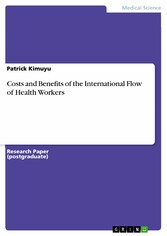Suchen und Finden
Costs and Benefits of the International Flow of Health Workers
Research Paper (postgraduate) from the year 2017 in the subject Health - Public Health, grade: 1, Egerton University, language: English, abstract: This paper will provide an overview on the costs and benefits of health human resources migration Health economics is seemingly becoming one of the most significant elements of healthcare sustainability. Despite the slowdown experienced in the realization of health transition in most countries, the current wave of globalization seems to have exerted a positive impact on global healthcare systems. However, shortages of health workers remain to be the greatest challenge to the development of healthcare systems, leading to imbalances in international human resources migration. This challenge has also prompted many countries to adopt cost-effective healthcare reforms to improve the sustainability of healthcare systems and improve health outcomes. For instance, training for health workers has been intensifies in developing countries. In 2008, Australia drafted primary healthcare reforms to ensure efficient flow of healthcare services by reducing healthcare expenditure. These reforms were designed based on the estimation of healthcare expenditure, which was expected to increase from 3.8 percent, in 2006-07 to 7.3 percent of the Gross Domestic Product, in 2046-47. However, trends of healthcare costs are changing drastically, owing to the current international flow of healthcare professionals, which has influence health economics..
Alle Preise verstehen sich inklusive der gesetzlichen MwSt.







